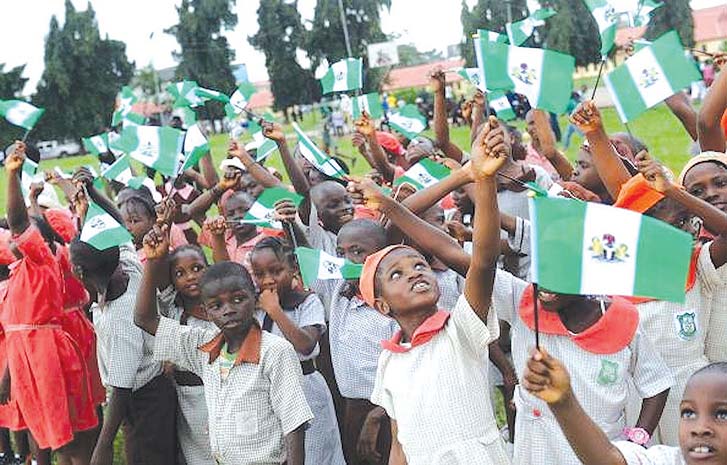As Nigerians prepare to mark the annual Children’s Day celebration today, there is little to truly rejoice over when assessing the dire situation facing the nation’s fabled future hope- the children.
The sobering reality is that the prospects of an entire generation are being sabotaged by a multitude of threats – from terrorist abductions and rampant school closures to alarmingly high rates of child labor and child marriage.
Rather than safeguarding the rights and wellbeing of its youngest and most vulnerable citizens, Nigeria is presiding over a crisis that imperils the very future of the country itself.
The chilling statistics lay bare the grim nightmare engulfing Nigerian children. A staggering 18.3 million children are out of school, more than the entire population of some countries.
To put it in proper perspective, the number of out-of-school children in Nigeria is more than the population of Norway, Singapore, and Cuba. This is shameful and should not be allowed to continue.
In the considered opinion of this newsaper, this dismal distinction as having the highest number of out-of-school children globally is a scar on the nation’s conscience.
In the conflict zones of the northeast and northwest in particular, the pursuit of education has become a life-endangering act of bravery, with over 1,600 children abducted or kidnapped from their schools since 2014 according to Save the Children.
Just in the first three months of 2024, over 200 more children were seized by bandits from their classrooms in Kaduna and Sokoto states alone.
As UNICEF’s Nigerian director Dr. Tushar Rane laments, a shocking 439 schools nationwide were closed in 2023 due to occupation by state and non-state actors or fear of attack.
In regions gripped by the murderous depredations of Boko Haram and criminal gangs, parents are forced into the unconscionable “choice” of risking their children’s lives to access education or resigning them to lives of illiteracy and diminished opportunity.
This untenable dilemma is a horrific injustice violating the fundamental rights of Nigeria’s youth.
Yet the assaults on their future do not end there. Nigeria has the ignoble distinction of being the third highest country for child brides globally, with 23.6 million women married before age 18 and over 10 million before even age 15 according to UNICEF data.
Robbed of their childhood and access to education, these young girls are condemned to cycles of poverty, poor health, and marginalization. The physical and psychological toll of such reprehensible practices is unimaginable.
As if that was not enough, over 24 million Nigerian children are engaged in child labor as of 2022, with a staggering 14.3 million performing hazardous work according to the National Bureau of Statistics.
Many of these vulnerable youth toil in dangerous mines, fields and factories, exploited as a cheap source of labor while being deprived of education, recreation and the fundamental joys and rights inherent to childhood itself.
These are not mere statistics or abstract numbers, but represent a generational crisis that jeopardizes Nigeria’s prospects and her very future as a nation.
With millions subjected to deprivations of basic rights, lack of schooling, forced marriage, and hazardous labor, how can the country possibly cultivate the educated, empowered citizenry required to catalyse economic development, democratic governance and social progress?
A nation that fails to invest in its youth is forfeiting its own immense potential and human capital.
While noble efforts have been made – such as 34 of Nigeria’s 36 states adopting the Child Rights Act to combat abuse – rhetoric and limited actions are a feeble bulwark against the calamity threatening an entire generation.
Clearly, in our opinion, much bolder steps and an unwavering national commitment prioritising children’s rights, security and wellbeing is desperately required.
The federal government must robustly secure educational institutions as safe zones, increasing deployments of security forces and accountability for derelict officials who fail to safeguard schools.
Concerted efforts backed by meaningful budgets must boost school enrollment, eradicate child labor, end the scourge of child marriage, and address the root of societal and economic drivers that place Nigerian children at such grave risk.
Failure is simply not an option – for if this nation cannot protect the hope, future and fundamental rights of its children today, it will imperil its own tomorrow and succumb to the generational cycle of poverty, instability and insecurity.
On this Children’s Day, it is a moral imperative for Nigerians to look clear-eyed at the daunting challenges confronting the nation’s youth.
Celebrating the potential and resilience of Nigerian children rings hollow amidst the grim realities of abductions, labor exploitation, lack of education and stolen childhoods.
Beyond platitudes, it is actions that must become the true celebration – a national mobilisation to secure brighter future for the next generation and fulfill their fundamental human rights.
For in safeguarding its children today, Nigeria protects its own hard-won democracy, prosperity and potential as a force for progress in Africa and the world. Prioritising children is the preeminent priority.





